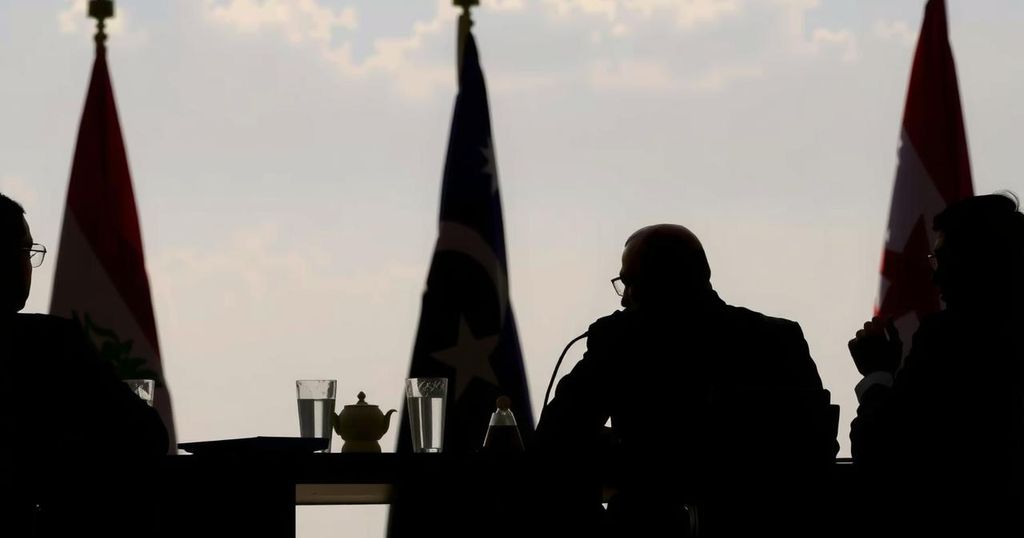Egypt, Jordan, Iraq Condemn Israeli Actions in Lebanon and Gaza, Call for International Intervention
Egypt, Jordan, and Iraq’s foreign ministers condemned Israeli aggression in Gaza and Lebanon, urging for international intervention to resolve the escalating conflict. They emphasized the need for an immediate ceasefire to prevent further civilian casualties, while reports from Lebanon highlight significant loss of life from ongoing airstrikes. The situation remains critical, with warnings of potential full-scale war looming as both sides continue military operations.
The foreign ministers of Egypt, Jordan, and Iraq convened and issued a robust denunciation of Israeli military operations in both Gaza and Lebanon, underscoring the urgent need for international intervention to halt the intensifying conflict. This meeting transpired on the margins of the 79th session of the United Nations General Assembly in New York, where the ministers deliberated on the advancement of cooperation within their trilateral framework, building towards an impending leadership summit in Cairo. In their joint statement, the ministers articulated that to effectively mitigate the escalating violence, it is imperative to first cease the Israeli offensives on Gaza. They expressed serious concern regarding the ongoing aggression against Lebanon, cautioning that Israel’s actions could precipitate a broader regional conflict. The statement included, “The escalating violence must stop, starting with halting Israeli aggression on Gaza.” The urgent appeal extended to the international community and the United Nations Security Council, emphasizing Israel’s accountability for the deteriorating situation, which threatens the stability of the entire region. Simultaneously, the conditions within Lebanon have deteriorated markedly, with the country’s Health Minister, Firass Abiad, branding the situation as “carnage” due to the overwhelming number of casualties resulting from extensive Israeli air strikes targeting Hezbollah. Abiad articulated concerns that a significant portion of the fatalities, reportedly over 550, included civilians—among them women and children. Israeli forces have claimed responsibility for attacking numerous Hezbollah locations, asserting that the group was utilizing civilian areas for weapon storage. Continuing these hostilities, the Israeli military executed a targeted strike that resulted in the death of the head of Hezbollah’s rocket forces, with Prime Minister Benjamin Netanyahu asserting that the group is leading Lebanon “to the edge of the abyss.” Hezbollah retaliated by launching multiple rockets into Israeli territory, marking a significant escalation with a longer-range missile reaching as far as Tel Aviv, although Israeli defenses reportedly intercepted the projectile without causing injuries or damage. In spite of these persistent Israeli strikes, reports indicate that Hezbollah’s command structure and extensive tunnel network, along with an arsenal built up over the past year, have fortified the group against these confrontations. The Israeli military has recently eliminated key Hezbollah military leaders, but the group continues to launch counter-attacks with considerable resolve. The gravity of the situation was highlighted with a targeted airstrike that demolished a residential building in Lebanon, resulting in the death of six family members, including children. Simultaneously, Human Rights Watch has condemned Israel’s extensive bombing campaign, calling on the United Nations to investigate the attacks and the context of Hezbollah’s retaliatory actions.
The recent intensification of conflict between Israel and Hezbollah has escalated following Israel’s airstrikes in Lebanon, which have resulted in considerable civilian casualties. The broader context includes a longstanding hostility between these entities, exacerbated by regional tensions involving other Arab states. The involvement of the foreign ministers of Egypt, Jordan, and Iraq further underscores the collective Arab concern regarding Israel’s military actions, aligning these nations in a diplomatic effort to seek international support for intervention to alleviate the escalating violence. As hostilities continue, the humanitarian crisis in the affected areas raises alarms regarding civilian safety and potential for widespread warfare in the region.
The foreign ministers of Egypt, Jordan, and Iraq have formally condemned recent Israeli military actions in Gaza and Lebanon, calling for urgent international intervention to de-escalate the situation. Serious humanitarian concerns have emerged, with rising civilian casualties and the risk of full-scale war heightening tensions. As international leaders call for a diplomatic resolution, the continuing violence necessitates critical scrutiny and action from the global community to avert further deterioration of regional stability.
Original Source: www.dailynewsegypt.com




Post Comment